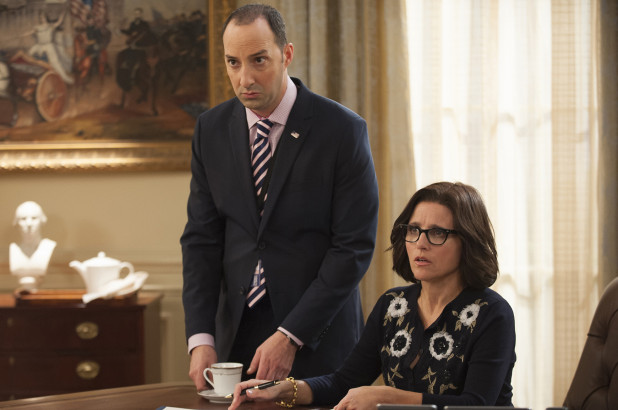Family Support During Cancer Journey
- “Seinfeld” actress Julia Louis-Dreyfus, 62, is grateful her podcast “Wiser than Me” is the number one podcast in the U.S. She credits her mom as the “secret sauce” to its success. The actress’ family has been influential in her ability to make it through breast cancer with their support.
- Louis-Dreyfus was diagnosed with stage 2 breast cancer in 2017 and underwent six grueling weeks of chemotherapy and a double mastectomy (removal of both breasts) for treatment to help her reach remission.
- Patients are encouraged to seek a support group, talk to a mental health professional, and keep their support team connected with your care team. The added support helps you with everyday tasks and can offer an emotional boost during challenging treatment.
Veteran actress Julia Louis-Dreyfus, 62, is basking in the success of her new podcast after Apple named “Wiser than Me” the number one podcast in the U.S. The “Seinfeld” actress took to Instagram to thank fans for thrusting her show to the number one spot.
“Thank you so much for making ‘Wiser Than Me’ one of your top podcasts of the year…Thank you, thank you, thank you,” Louis-Dreyfus said in an Instagram video.
Read MoreView this post on Instagram
“The secret sauce of the show is also here with me, and she wants to say something,” Louis-Dreyfus said.
“I’m finally getting listened to by my daughter,” Bowles said jokingly.
The “Veep” actress previously credited her family for helping her through tough times, most notably her breast cancer journey in 2017.
“The people that I relied on the most, besides the very capable doctors and nurses who took care of me, were my family and my close friends,” Louis-Dreyfus previously told People.

According to the Washington Post, Judy Bowles is an award-winning writer of short stories. Her family as a whole has an abundance of talent and wealth intertwined. Julia’s sister, Lauren Bowles, is also an actress. Her father, Gerard Louis-Dreyfus, “was a billionaire financier” worth $4 billion, Parade reports. Upon his death in 2016, his net worth was reportedly shared among his family. Julia has amassed great wealth herself stemming from her successful acting career, which includes runs on “Saturday Night Live,” “Seinfeld,” “Veep,” and more productions.
Helping Patients Cope with a Breast Cancer Diagnosis
Family Support Counts
A support system can comprise loved ones like family and friends. It can also include strangers who have come together because of a shared cancer experience. Mental health professionals can also be critical parts of a support system.
WATCH: Sharing details about your cancer diagnosis.
“Some people don’t need to go outside of their family and friend’s circle. They feel like they have enough support there,” psychiatrist Dr. Lori Plutchik told SurvivorNet.
“But for people who feel like they need a little bit more, it’s important to reach out to a mental health professional,” Dr. Plutchik added.
Dr. Plutchik also stressed it is important for people supporting cancer warriors to understand their emotions can vary day-to-day.
“People can have a range of emotions. They can include fear and anger, and these emotions tend to be fluid. They can recede and return based on where someone is in the process,” Dr. Plutchik said.
Julia’s Breast Cancer Journey Toward Remission
Julia Louis-Dreyfus’ cancer journey helped her build resilience. She learned she was facing cancer on one of the biggest nights in her career in 2017.
“I started laughing. Well, because the night before, I had won an Emmy. And so, I came downstairs and…the Emmy was there. It was like on the dining room table. I’m coming down to get coffee. My cell phone rings, and it’s my doctor saying, ‘Guess what, you have cancer,’” Louis-Dreyfus said, according to People.

Dreyfus was stunned by the news she had stage 2 breast cancer.
“Of course, I did laugh, and then I became hysterical, crying, because I was terrified, as most people are, or as all people are, if they get a diagnosis like that,” she said.
Stage 2 breast cancers are either larger than stage 1 tumors or have moved to a few nearby lymph nodes. Treatment will likely be some combination of surgery, radiation, and chemotherapy. If chemotherapy is also needed after surgery, the radiation is delayed until the chemo is done. The same approach is taken to hormone receptor and HER2 positive as stage 1.
After her diagnosis, she shared the news publicly on her social media channels to an outpouring of support.
As Louis-Dreyfus bravely fought her breast cancer head-on, she underwent six rounds of chemotherapy and a double mastectomy during her treatment. Chemotherapy can cause several side effects, including nausea, vomiting, and hair loss. Your doctor can help you manage some of these side effects. Fortunately for hair loss, while it usually begins about three to four weeks after starting chemotherapy and continues throughout treatment, it usually regrows after treatment concludes.

She also underwent a double mastectomy during treatment. During this procedure, both breasts are removed to get rid of cancer. The procedure may also be a preventative measure for women at high risk of developing breast cancer. Afterward, some women decide to have their breasts reconstructed and have implants put in, while others don’t have reconstruction at all.
“A double mastectomy typically takes about two hours for the cancer part of the operation, the removing of the tissue,” Dr. Elisa Port, Chief of Breast Surgery at Mount Sinai Health System, tells SurvivorNet.
By October 2018, Louis-Dreyfus announced that she was “cancer-free.” Remarkably, the brave actress is nearing the notable milestone of five years in remission.
What To Ask Your Doctor
If you have been diagnosed with breast cancer, you may have questions about keeping your strength through treatment. Here are a few questions to help you begin the conversation with your doctor:
- What treatment will I be receiving?
- What side effects are associated with this treatment?
- Are there steps I can take daily to help minimize these side effects?
- What physical activity routine do you recommend for me during treatment?
- Do you have recommendations for someone who doesn’t particularly enjoy exercise?
Learn more about SurvivorNet's rigorous medical review process.

